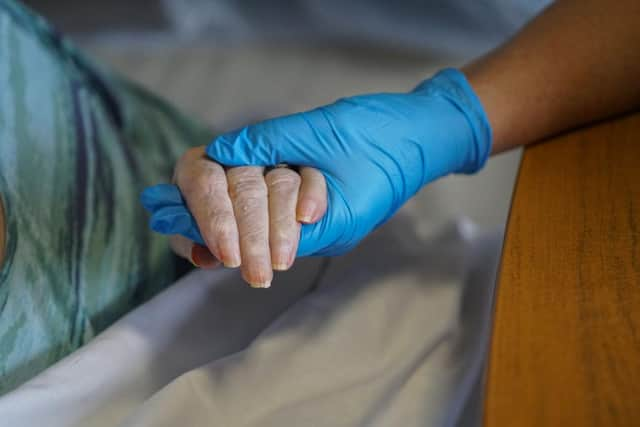New rule that forces care home residents to isolate after outside visits ‘inhumane’ warn care providers
and live on Freeview channel 276
New guidance requiring care home residents to isolate following any trips outside their home has been met with dismay by care home providers and leaders across England
Under new guidance issued by the Department of Health and Social Care (DHSC), care home residents are being told to isolate for 14 days following any visits outside of the facility they live in.
Advertisement
Hide AdAdvertisement
Hide Ad“This is to ensure that – in the event they have unknowingly become infected while out of the home – they minimise the chances of passing that infection on to other residents and staff”, reads the new guidance, which applies to care homes in England, and took effect on April 12.


Mike Padgham, Chair of the Independent Care Group, a care home provider in York and North Yorkshire, told National World that while he appreciates the “importance of being cautious” regarding potential infections, “it seems inhumane not to allow older people out” while the rest of the country is enjoying renewed freedoms.
The guidance applies unilaterally to care homes and any visits outside the home, including outdoor social contact - an activity the rest of the adult population is currently able to participate in.
This application of a “blanket” rule for all activities and care homes, says Mr Padgham, doesn’t take into account “common sense” assessments of what kind of activities are and aren’t risky in terms of viral transmission.
Advertisement
Hide AdAdvertisement
Hide Ad“If, for example, residents were to go out in a minibus wearing masks, being driven by a staff member and don’t come into contact with anyone from outside, we don’t think they should be subject to 14 days isolation.”
Vic Rayner, CEO of the National Care Forum (NCF) – the leading association of not for profit care providers - points out that the rules will also prevent older people from voting in person at upcoming local elections in May.
“The whole experience of voting for the majority of people living in care homes will have been in person, often for many years at the same polling station, going through the motions in a way that is both familiar and a connection to wider society”, Ms Rayner said.
“Getting the vote is a rite of passage. Losing the right to vote in person is a national scandal.”
Advertisement
Hide AdAdvertisement
Hide AdA balance must be struck, said Mr Padgham, between the risk of viral transmission and the quality of life for older residents, many of whom have been isolated from the outside world for over a year.
A sensible approach, he says, would be to “do an individual risk assessment and determine what’s in their best interest” with regards to trips outside the home. “We have to take some risks, otherwise their quality of life is zero”, he added.
Ms Rayner, meanwhile, said the restrictions “need to be changed”, given that the “choice” has been taken away from older people who wish to vote in person, rather than by post.
It “cannot and should not be acceptable”, says Ms Rayner, for the rest of the population to be “out enjoying pub lunches, attending weddings - when those of all ages who live in care homes cannot even travel five minutes down the road without then spending the next fourteen days isolating in their room.”
Advertisement
Hide AdAdvertisement
Hide AdThe government said they have legislated to allow those isolating because of covid to obtain an emergency proxy vote up to 5pm on election day. A government spokesperson told National World:
“Any visit in or out of a care home brings some risk of infection and our priority must always be to manage to transmission and keep vulnerable residents safe.
“Everyone who is eligible to vote will have the opportunity to do so in these elections. People can apply for a postal vote by 20 April or a proxy vote by 27 April.”